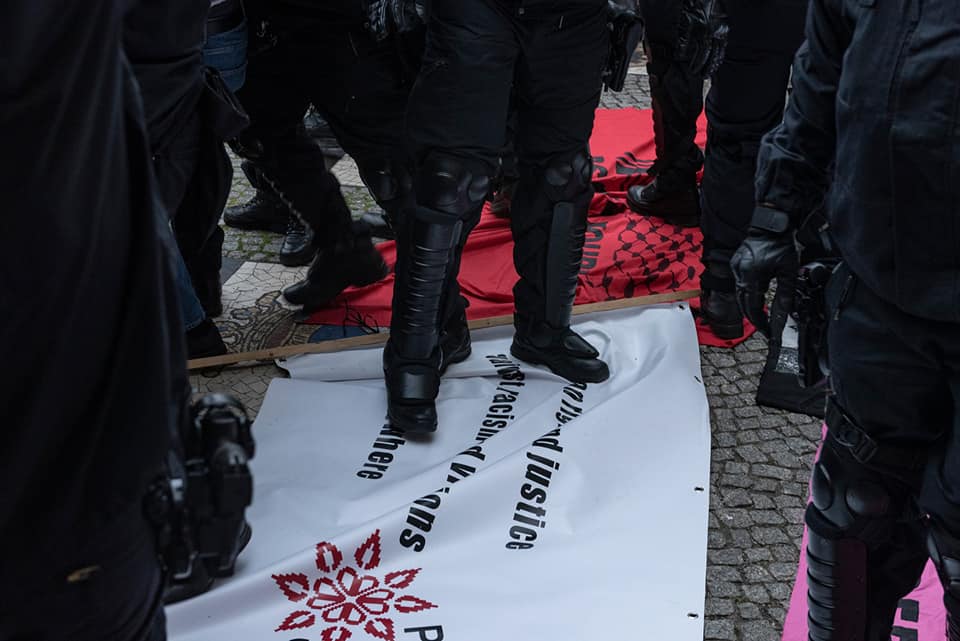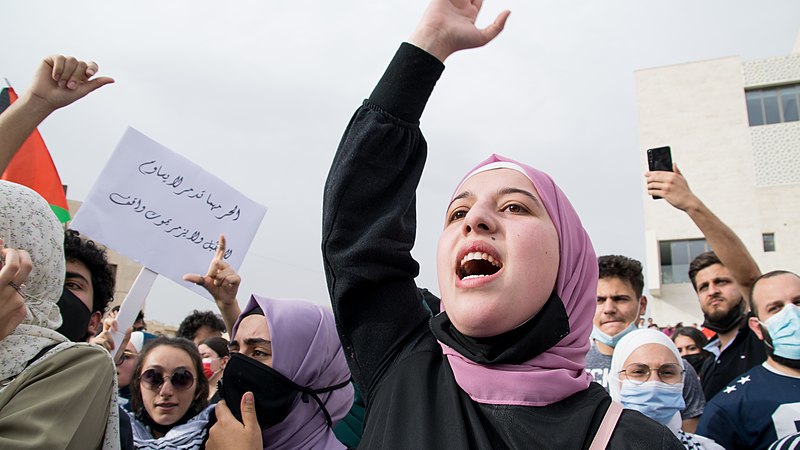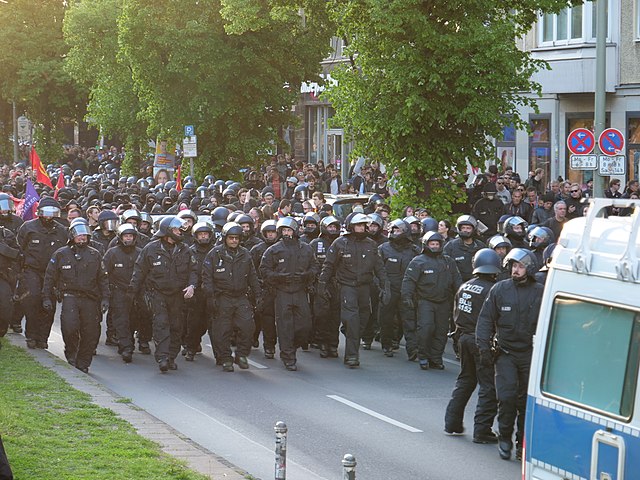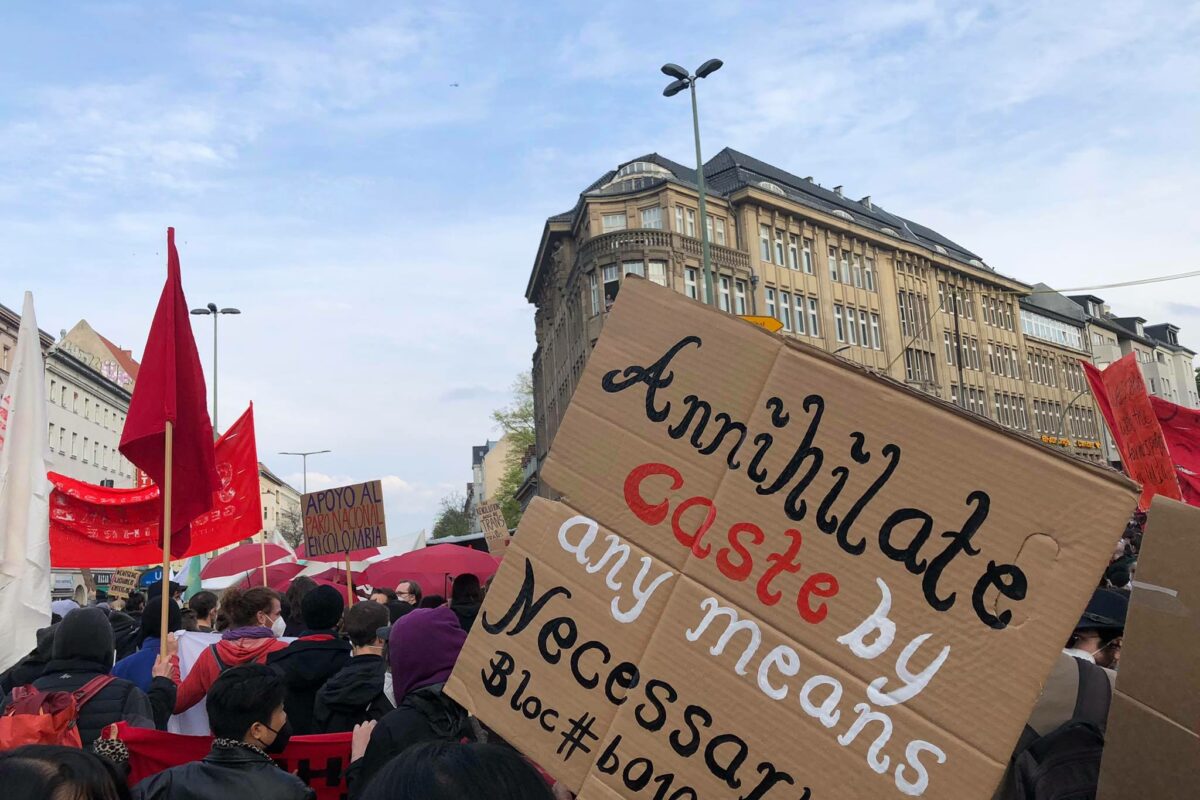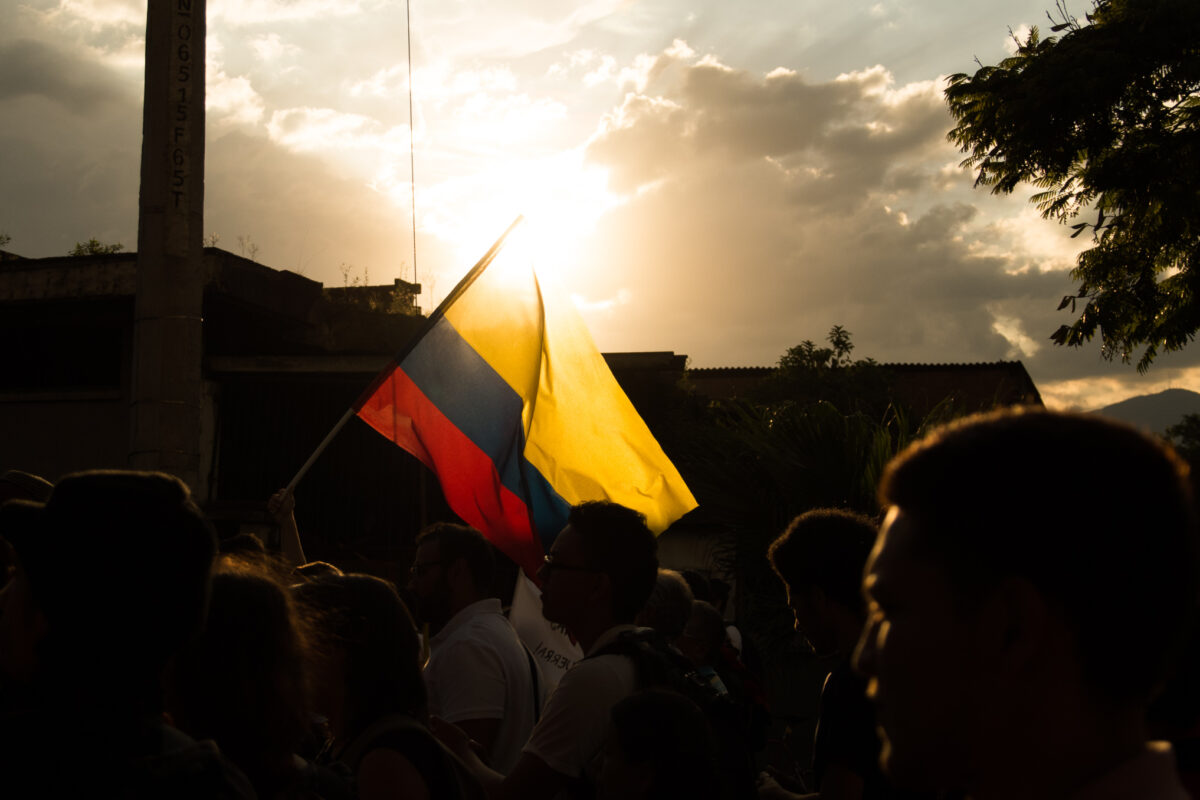On Wednesday, 12th May, as Israeli bombs were falling on Gaza, the Jüdische Stimme (German equivalent of the Jewish Voice for Peace) and Palästina Spricht organised a rally to mourn the Palestinian victims of these attacks, and to protest the murderous actions of the Israeli State. At the beginning of the rally we were told that some Palestinians on the rally had just lost family members.
The event was necessary given the prevailing atmosphere in the German media. As a German journalist based in Britain reported:
“I listened to the German news today, it mentioned 7 Israeli fatalities twice, it mentioned “thousands of rockets” being fired on the Palestinian side. It didn’t mention any Palestinian victims. I’ve been following the news for more than 20 years, half of that time I have worked as a journalist myself. None of this should be a surprise. This is how they’ve always reported on Palestine. It still makes my blood boil.”
Although the bombing of Gaza is acknowledged, it is generally reported as retaliation, or as counter-strikes to Hamas missiles. There is barely any mention of what came before – the Israeli lynch mobs which have been terrorising Palestinians throughout Israel for weeks, encouraged by the Israeli government’s decision to expel the Palestinian inhabitants of Sheikh Jarrar in East Jerusalem.
It is true that Ali Abunimah, the co-founder of the Electronic Intifada was allowed a short interview on Deutsche Welle. But it didn’t take long before Deutsche Welle removed the interview, and issued a grovelling apology, claiming that the interview contained antisemitic statements. Watch the interview for yourself and see if you can find anything which is remotely antisemitic.
Police intimidation
Despite the legitimacy and necessity of the rally, it was surrounded by an intimidating number of tooled up RoboCops. The police made announcements over their tannoy telling us that flag burning and the presence of Hizbollah symbols were illegal, although there was no sign of anything of the kind. This was just the first sign that they did not intend to let this rally go ahead without disruption.
A number of speakers had planned to address the hundreds of people stood in front of the Rathaus Neukölln, but few were able to speak. Whenever anyone started to say anything, they were interrupted by a police loudspeaker warning of Corona regulations. The people who were silenced in this way included someone who was explaining how 6 of his relatives – aged between 3 and 20 – had just been killed.
https://video.wixstatic.com/video/fe8979_483ea3b7fb0d433a80a3831841b8beb7/720p/mp4/file.mp4
Random arrest of a young Arab boy
Fanny-Michaela Reisin, who was able make a speech for the Jüdische Stimme, despite repeated interruptions from the police, reports:
“I am still annoyed. The demonstrators did indeed stand together and listen with concentration, which is the point of a rally. But the police were not prevented from persistently and massively disrupt the meeting! The provocative – and, I presume intentionally misguided – orders (above all, Hizbolla and flag burning) were unseemly and abusive. In view of further rallies, all this should not remain uncommented.
(emphasis in the original)
A statement, jointly signed by this website, explains what happened next: “After less than an hour, police violently disrupted the gathering on the thinnest of pretexts in what was a clear show of racism. As police charged into the diverse crowd, they beat, punched and smacked demonstrators indiscriminately and picked people of colour out at random for arrest. In the end, over 20 people were arrested – predominantly people of colour.”
Everyone was wearing a mask, and the only time that social distancing was endangered was during the many incursions by aggressive police. They regularly sent snatch squads into the crowd to arrest individual demonstrators – exclusively young men with Middle Eastern appearance. It is a wonder that everyone attending the demo maintained their cool and did not respond to police provocation.
Lawyer, Ahmed Abed, who was present at the rally said:
“From the very beginning, the police were not interested in a peaceful process. The contact man wanted their announcements to be read out in Arabic and German. But there was no Arabic translation. As the announcement were to be read out in German, the police said that they’d do it now. Then they went without warning into the crowd. Why couldn’t the police not simply speak? Instead, they shoved people, held them in an arm lock and threw them to the floor. Without warning. And all the time. The police did not want a peaceful demonstration.”












Screenshots from a video of an arrest. Note how the person was apprehended from behind and was not resisting, got violently put in a chokehold and their arms twisted. They were lifted up out of a sitting position by the chokehold on their neck
Racial profiling in action
Majed Absusalama from Palästina Spricht said:
“This brutal experience with the German Police expands the Israeli oppression to Berlin. It is very clear that the policemen were targeting Arabic looking men, this racial profiling of us is exactly what the Israeli Colonial Army is doing in Jerusalem against the Palestinians protesters.
I feel angry, very angry at the German state arming the Israeli army with weapons that are used to kill us. I am angry at the systematic violence and silencing that the Palestinian and the Palestinian solidarity is experiencing in Germany.
And now some German municipalities in Berlin are raising the Israeli flags in solidarity which is disrespectful and humiliating to more than 72 Palestinians who were murdered by the Israeli army, 17 of them are children and 6 of them are women. I was afraid to live in a country that police you, surveil you and control you. I left Palestine to not be besieged and now the German state is besieging me and my community.”
It is slightly ironic that people protesting against state violence in Gaza were themselves victims of violent attacks by agents of the German state. It would be too far to say it was unexpected – we are now used to the level of policing and of the paucity of discussion of Palestine in Germany – but it is astounding how sure that the police were that they could get away with this.
https://video.wixstatic.com/video/fe8979_3fd0a6f1fced4067a52a75ade8f98c9b/720p/mp4/file.mp4
On the left of the screen you can see two cops shoving the same person twice for no apparent reason
What a contrast with the demonstrations of “Coronaleugner” (Corona liars) which have been regularly allowed to take place without either masks or social distancing, even when the demonstrators violently attack journalists. Here the police are reported as being “overwhelmed and uncoordinated”. Well, on Wednesday they were very coordinated. Some have said they were out of control – maybe, but they knew exactly what they were doing.
We are heading into elections on national and local level, where both the CDU and SPD will be running on law and order platforms. Berlin’s Interior Minister Andreas Geisel is an SPD member who has presided over heavy policing, particularly against anti-Nazi protestors and most recently against the Migrants’ Block on the 1 May demo.
Why Palestine is still the issue – especially in Germany
But this is about Palestine just as much as it its about the police. On the demonstration there were possibly more Israelis than there were white Germans. German guilt about what their grandfathers may have done to Jews means that although many people are distressed at what is happening to Palestinians, they find it difficult to critcize the Israeli State, let alone go on a demonstration.
This has got to stop.
In 2014, during the last sustained bombing of Gaza, radical Israelis organised a demonstration through Kreuzberg under the slogan “Deutsche Linke Wach Auf!” – “German Left wake up!” It had some effect. A couple of weeks later we managed to organise a demonstration which attracted 1,500 Germans, Palestinians and Israelis. This doesn’t seem much compared to the 150,000 who were marching at the time in London, but was a significant breakthrough in activating white Germans to march alongside other groups against the oppression of the Palestinians.
Since then, the dominant discourse on the white German Left has returned to its default position – the Middle East is “too complicated” and while most people do not support the Israeli state, many are reluctant to get involved. But after 17 children were killed in Gaza this week, and demonstrators were arrested in Berlin because of their background, the time for neutrality is over. As Howard Zinn was keen to say “you can’t be neutral on a moving train”.
https://video.wixstatic.com/video/fe8979_56bce03fb4344c8c855deb6714a5fcbd/360p/mp4/file.mp4
Video of the police attack on Wednesday’s rally
The left knows about media bias, about police violence and about racial profiling. Yet when it comes to Palestine, too often for too many people the discussion becomes “too complicated”. This is simply not good enough. Blaming “violence on both sides” has become the equivalent of saying All Lives Matter. It is not a good look.
Heavy policing of a demonstration for Palestine is the precursor for further repression, and while we will all suffer from this, some will suffer more than others. As Rohit – a member of the Berlin LINKE Internationals who was at Wednesday’s rally says “I personally as a POC didn’t feel comfortable around them even in a place where I just want to show my solidarity towards a cause I believe in.”
Glimmers of hope
There have been some good statements from the Left – from the LINKE working group on a Just Peace in the Middle East, from the LINKE Neukölln and from the SDS student organisation. These are to be welcomed and to be built on, but there is still a way to go.
We did see the start of a breakthrough 2 weeks ago, when Palestinian flags and banners led the revolutionary 1st May demonstration. The Palestinian presence was possible because of the intervention of Migrantifa and the experience of Black Lives Matters which have made the everyday life of Palestinians and other PoC more visible to white Leftists.
The police assault on the migrant/Palestinian block on the demo, was also consistent with their racist policing elsewhere. If BLM is building the links and calling for unconditional support for Palestine, the white Left must follow.
Tomorrow is “Nakba day”, the anniversary of the expulsion of Palestinians in 1948. Palästina Spricht have organised a demonstration which starts at Oranienplatz at 4pm. Especially because of Wednesday’s police violence, a high turnout is more important than ever – and not just from Palestinians. Do not leave our Palestinian brothers and sisters on their own.
As Sophia Deeg, long-standing campaigner for Palestinian rights who was at Wednesday’s rally, says
“I was proud that together we had managed so well. At the same time I am worried. This Saturday’s rallies on Nakba day in Berlin and in other cities will probably be used again by the police/the state to create images of ‘a violent crowd’ that has to be controlled by police intervention.”
The extent to which the police will be able to criminalize Saturday’s demo depends in part on our ability to mobilise people who don’t fit their racist stereotypes.
If you don’t want to go on your own, feel free to meet up with the Berlin LINKE Internationals who will be meeting at 15.30 at Hermannplatz, then at 15.45 in front of the Babylon Kino near Kotbusser Tor (Dresdener Straße 126). If you don’t want us to leave you behind, send us a mail at lag.internationals@die-linke-berlin.de
Discussing Palestine in Germany
After the practise, the theory. On Monday, Haneen Zoabi, Susan Neiman and Christine Buchholz MdB will be talking about Discussing Palestine in Germany. This will be an opportunity not just to understand why we are where we are, but to plan how we can get to
somewhere better. Over 500 people have already registered to attend. Why not join them?



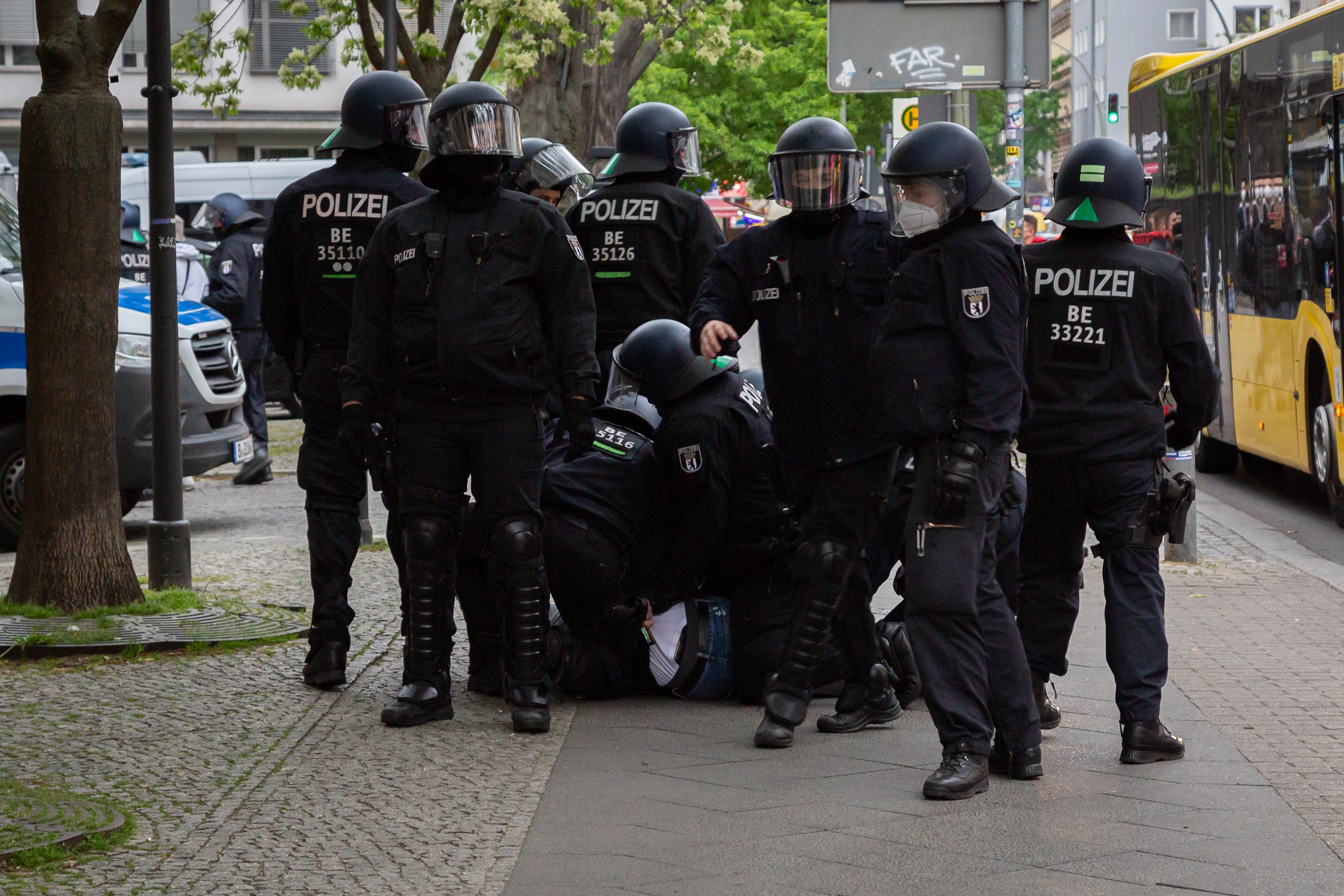


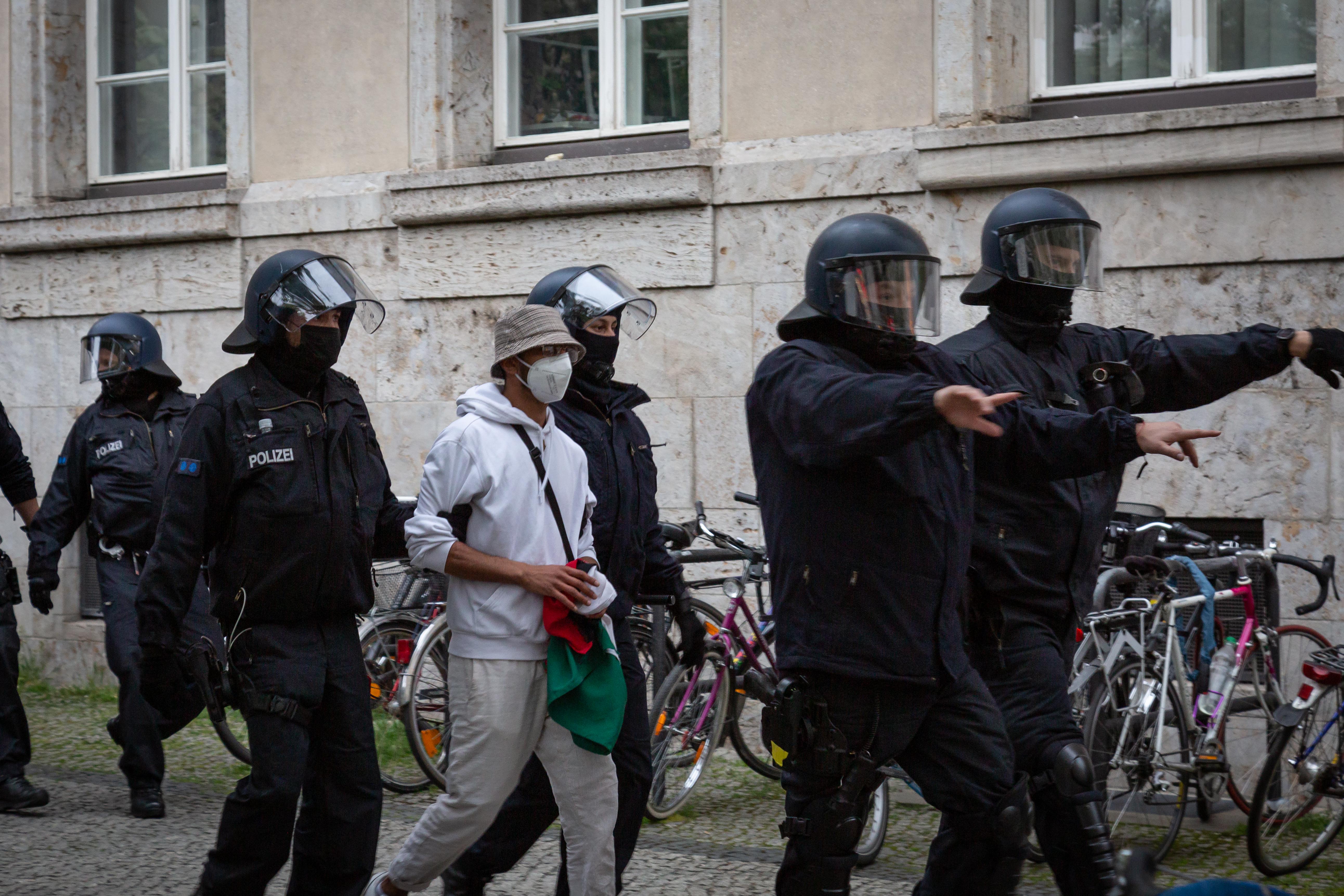



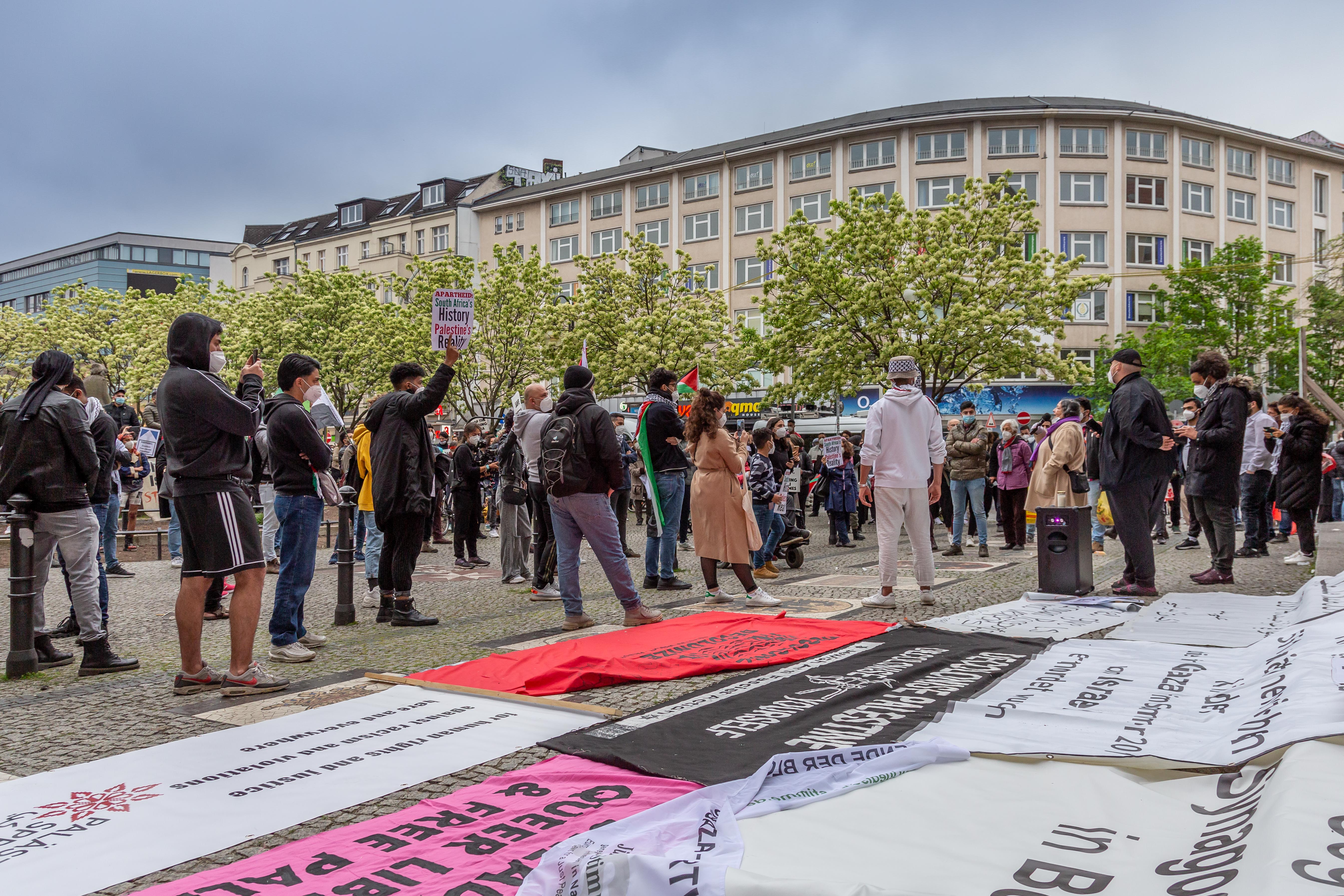

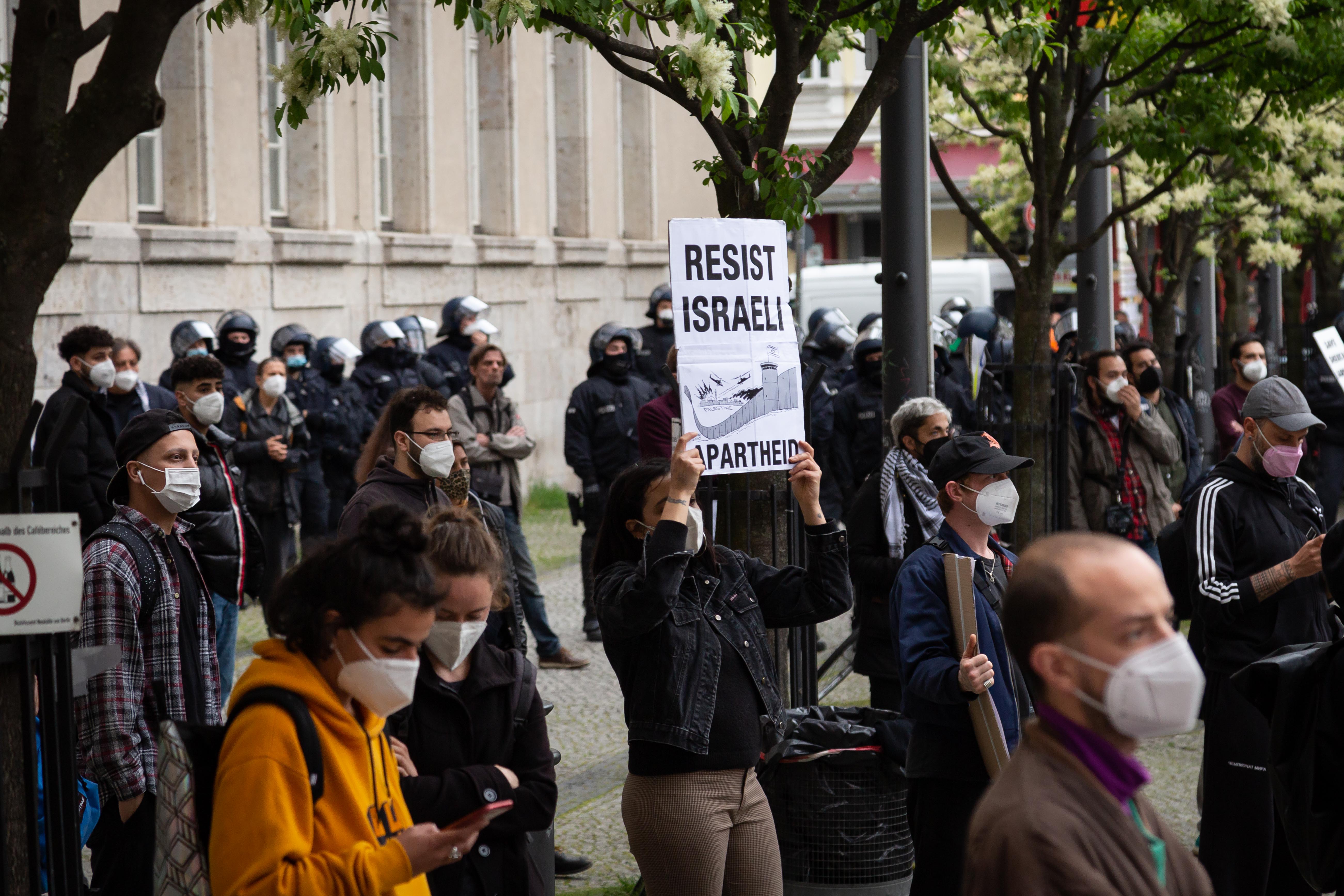















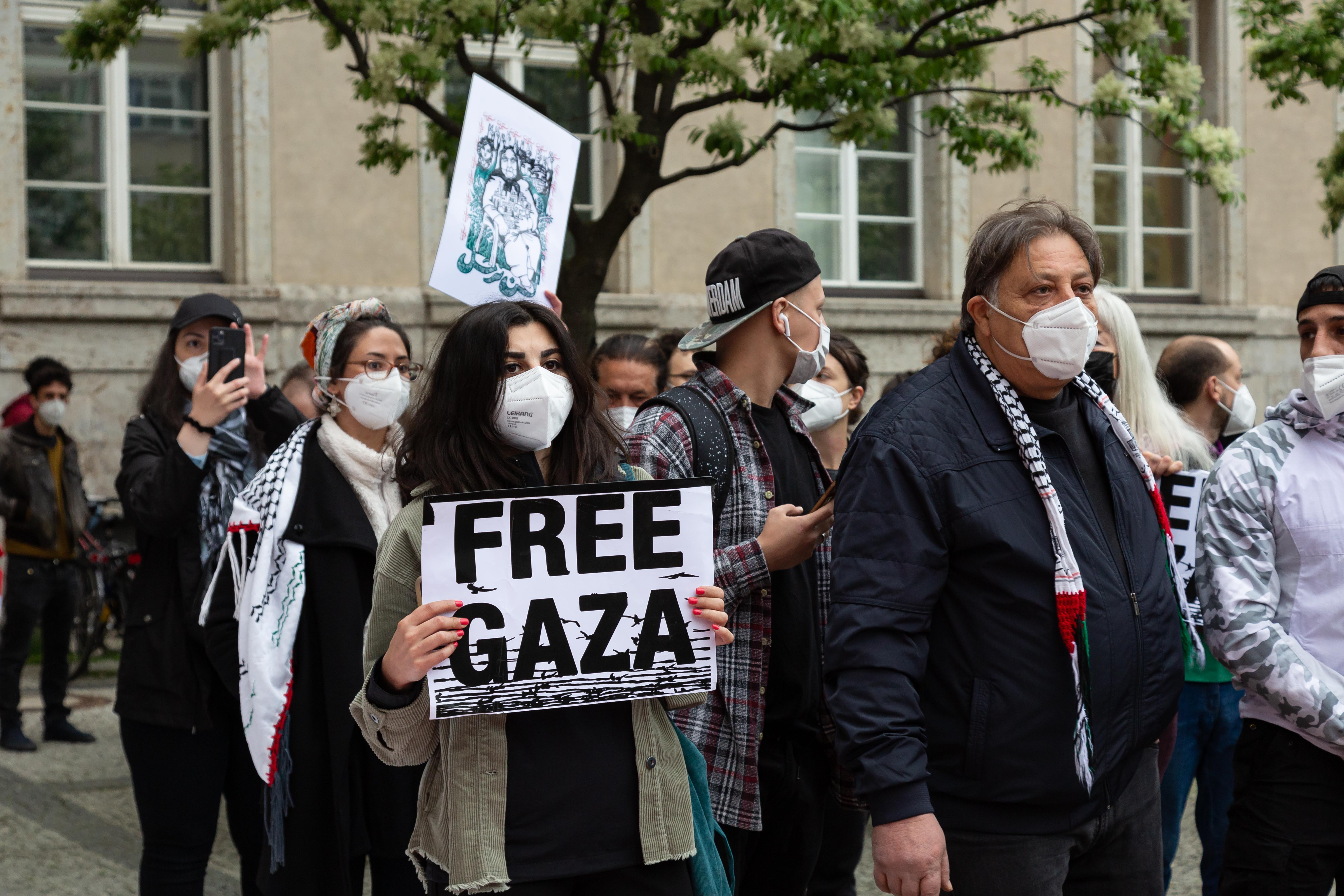





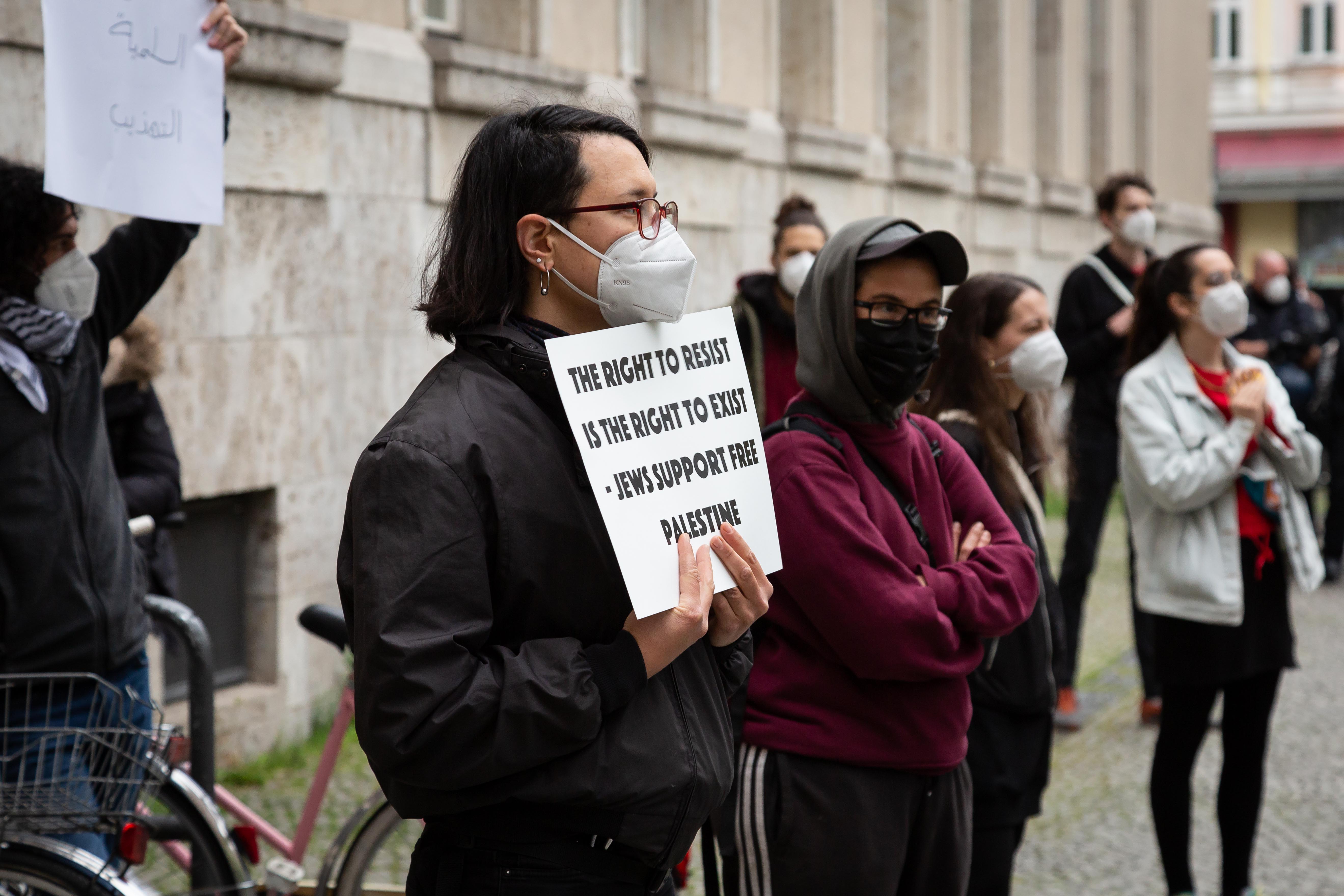




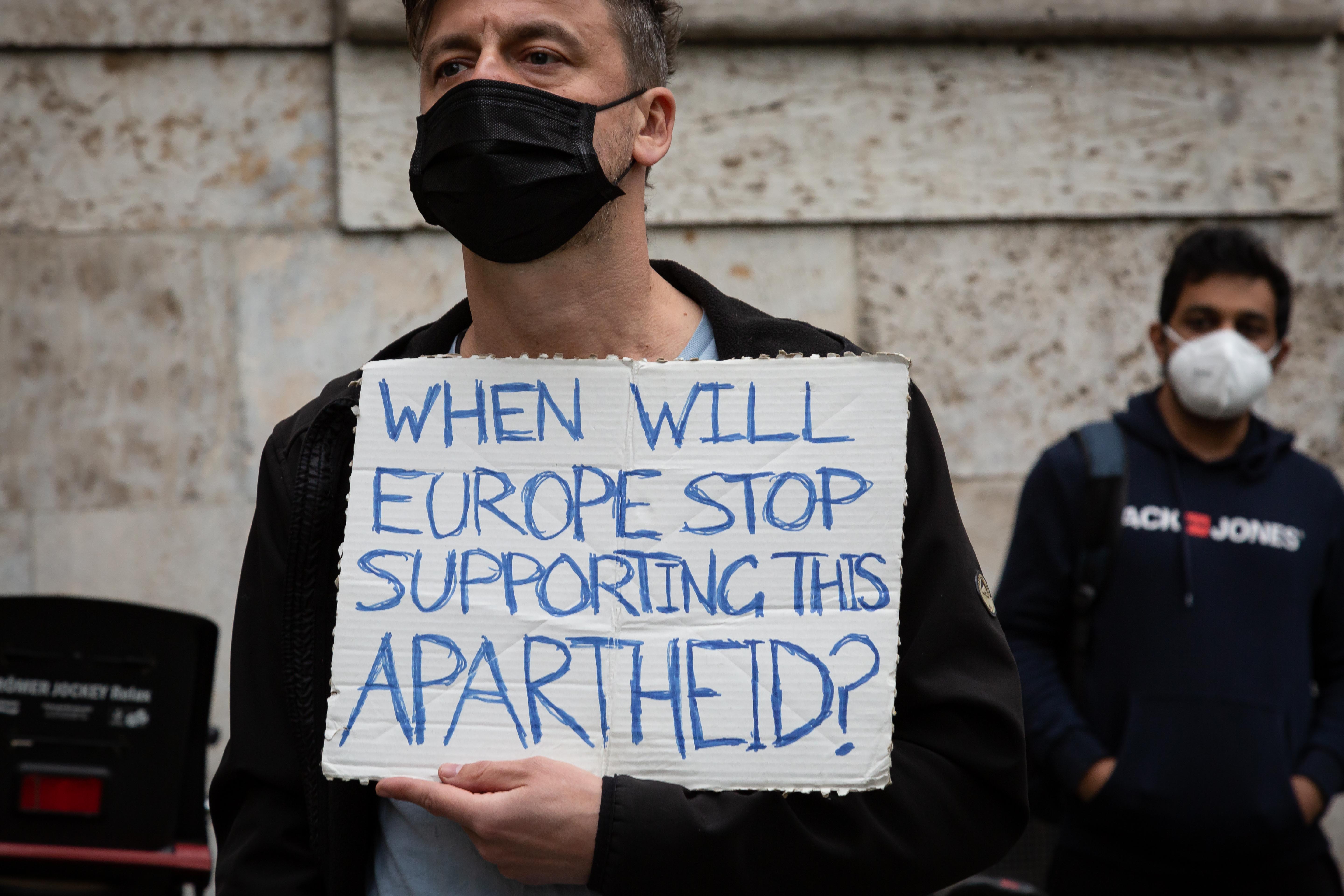





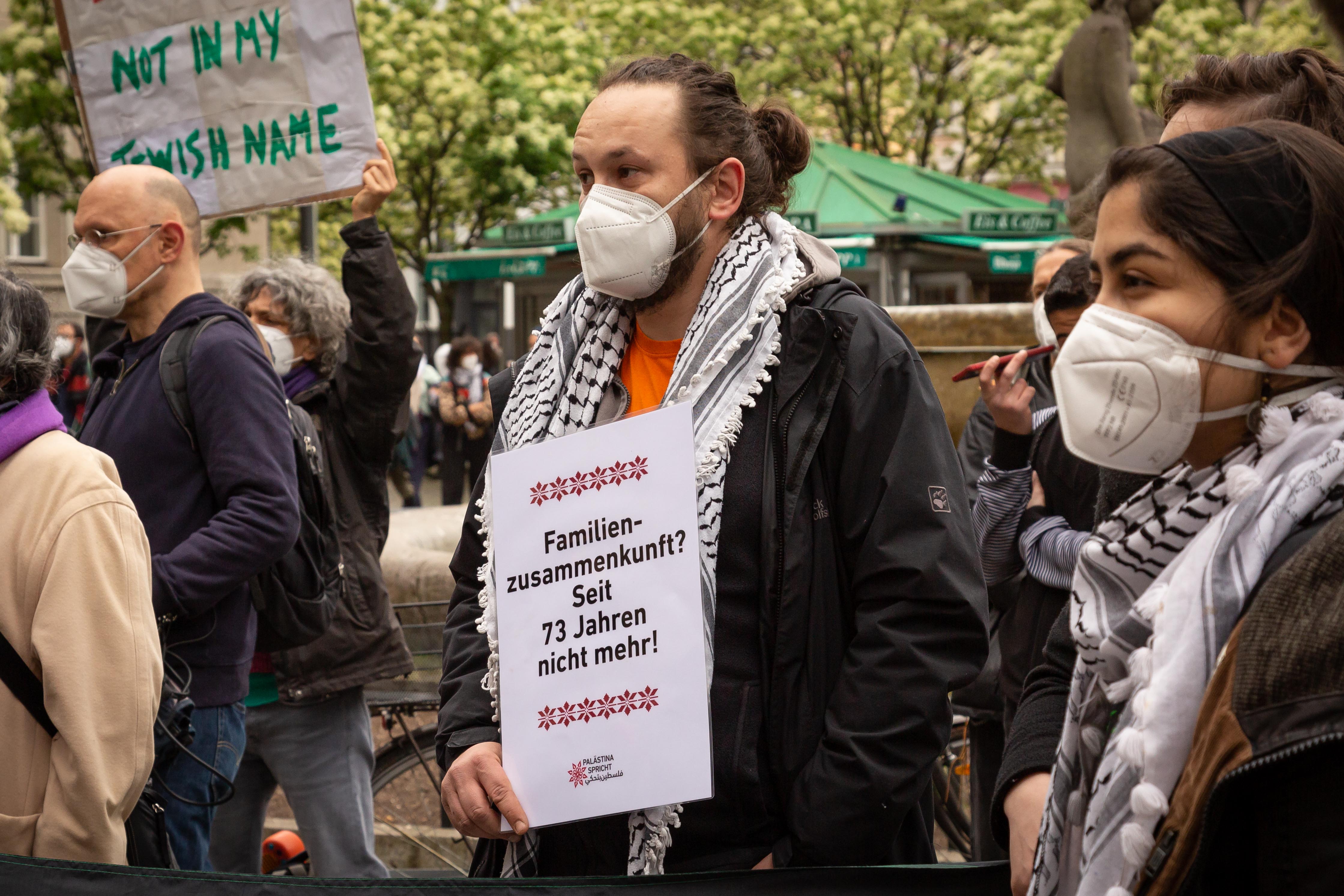














More photos from the rally
NOTE: if you know of anyone who was arrested at Wednesday’s rally, Palästina Spricht is trying to coordinate help. See the Palästina Spricht statement here, or contact them at info@palaestinaspricht.de
Phil Butland is the joint speaker of the Berlin LINKE Internationals and the Commisioning Editor of the website theleftberlin.com. Many thanks to the countless number of people who were on Wednesday’s demo and shared their experiences with me. See you all at Oranienplatz on Saturday.
